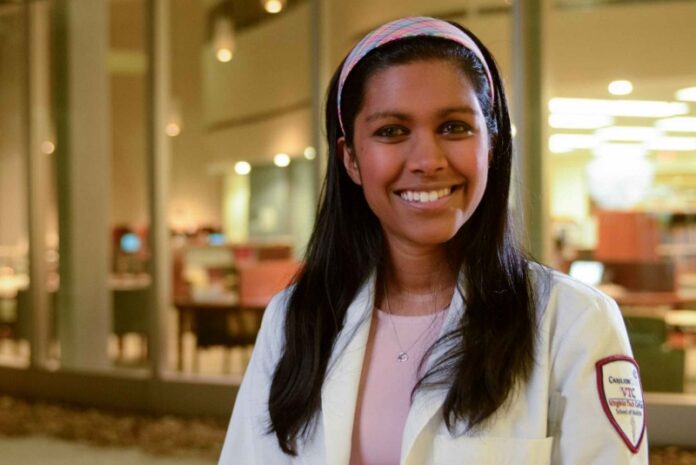
An illness during her teenage years sparked Kami Arulraja’s pursuit of a career in medicine. Now, the third-year student at the Virginia Tech Carilion School of Medicine is well on her way to fulfilling her dream.
An avid fitness buff, Arulraja struggled with exercise-induced anorexia in high school, a disorder characterized by excessive and compulsive exercise.
Now recovered, she credits the doctors who treated her illness for leading her on the path to becoming a doctor herself.
“Without those amazing physicians and the support of my wonderful family, who knows, maybe I wouldn’t be here today.” she said. “I don’t know of a better way to repay that care than to pursue a career where I can hopefully do the same for someone else.”
Another factor that naturally led her to medicine was her overwhelming passion for learning.
“I’ve always loved school,” Arulraja said. “Growing up, when family members would get sick, I would read everything I could to try to figure out what was going on and how to fix it. That kind of learning is what really drives me. That’s what I’m passionate about.”
Arulraja was one of two recipients of the Morgan Dana Harrington Memorial Scholarship this year at the school.
Daniel Harrington, vice dean of the Virginia Tech Carilion School of Medicine, and his wife, Gil, established the scholarship to honor the memory of their daughter, who was abducted and killed in 2009 after a concert in Charlottesville, Virginia. Morgan, 20, was a junior at Virginia Tech majoring in elementary education.
“I am so grateful to receive this scholarship,” she said. “It is really meaningful that the Harringtons set it up in their daughter’s name. It’s a wonderful way to immortalize her legacy.”
Having grown up in Cary, North Carolina, Arulraja is the daughter of Sri Lankan immigrants who instilled a healthy desire for achievement in their two girls. Arulraja graduated from Duke University with an interdisciplinary major in biological anthropology and anatomy. Her younger sister attends medical school at the University of Iowa.
After graduation in 2012, Arulraja enrolled in an intensive 10-month certificate program in biomedical sciences offered jointly through Georgetown and George Mason University.
“I wanted to reinforce that my desire really was to go into medicine,” she said. “I wanted to be 100 percent sure.”
By the time she completed the program, she was certain medicine was her calling.
Arulraja spent another year doing prostate cancer research at Duke, during which time she applied to and visited medical schools that were within driving distance of Durham, where her long-time boyfriend currently lives. Admittedly, she didn’t know anything about the Virginia Tech Carilion School of Medicine when she applied, but that changed when she was invited to interview during the fall of 2013.
“I was really wowed on my interview day,” she said. “I still remember driving back to Durham that evening and thinking, ‘I did not expect to love that school as much as I did.’”
When she started in the summer of 2014, Arulraja was a little skeptical about the school’s small-group, problem-based learning method.
“I wasn’t sure what I was getting out of it,” she said. “But by the end, I absolutely loved the learning method, and I can’t imagine learning the material any other way. Plus it really helped me to become much more confident in my presentation skills because teaching rotated among our group members.”
Arulraja was attracted to the school for its strong research focus whereby every student spends four years working on a research project of publishable quality. She is working with Paul Dallas, physician and assistant professor of internal medicine, to assess the utility of a continuing medical education intervention designed to change physician practice regarding blood transfusion.
“When we looked at the data from our hospital, the literature, and the guidelines for performing transfusions, we found that we were over-transfusing,” she said. “Excessive red blood cell transfusions are risky as seen by unfavorable patient outcomes. They also use valuable resources and are unnecessarily costly to patients and the health care system. The goal of our research is to merge the gap between clinical practice and evidence-based medicine in a cost-effective manner.”
When she’s not studying, in the clinic, or working on her research, Arulraja is active in student groups and community service. She is involved in the American Medical Association and the Medical Society of Virginia, having held various leadership positions and attended state and national meetings throughout medical school.
With an interest in being a pediatrician, Arulraja is also an active volunteer at the Boys and Girls Club of Southwest Virginia, an organization that provides a safe, fun environment for children who need after-school care.
Arulraja’s service at the Boys and Girls Club complements the myriad of volunteer experiences with children that she participated in before medical school. These included being a tutor and serving as a volunteer program co-coordinator at Duke University Hospital as part of a program that placed volunteers in waiting rooms to interact with pediatric patients and their families and help lower their anxieties.
“When I worked with children in the hospital, I felt at home,” she said. “This is how I felt when I did my rotation in pediatrics, too. I love this patient population. This is definitely what I was meant to do.”


